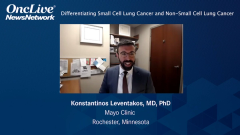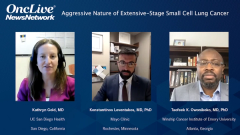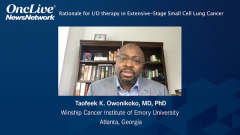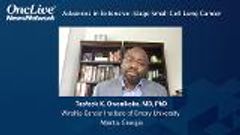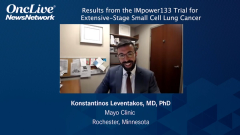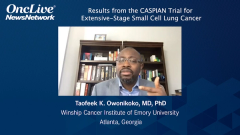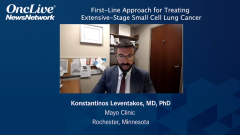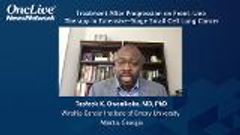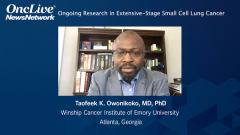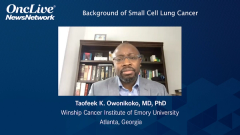
Rationale for I/O therapy in Extensive-Stage Small Cell Lung Cancer
Episodes in this series

Kathryn Gold, MD: Let’s shift gears and move into the recent advances for small cell lung cancer. Immuno-oncology [I/O] has rapidly changed over the past 5 years and changed how we treat many tumors. What’s the rationale for using immunotherapy in small cell lung cancer?
Taofeek K. Owonikoko, MD, PhD: Small cell lung cancer has certain unique biologic properties, some of which make us feel that they should respond to immunotherapy and other sides that make us feel that immunotherapy will probably not be successful based on our current understanding of how some patients or tumor types will respond to immunotherapy by itself. We know that patients with tumors that have very high tumor mutational burden in general tend to respond better than those with low tumor mutational burden. With small cell being one of those tumor types with high tumor mutational burden, one would expect that this is a tumor that would be vulnerable to checkpoint blockade, so-called immunotherapy.
The other aspect of small cell, the way you look at it is actually under the microscope when the pathologist looks for immune cells. The majority of these tumors do exclude immune cells, so they tend to be immunologically cold. Even though the phenotype of the tumor should suggest vulnerability to immunotherapy, the absence of tumor infiltrates and lymphocytes in a large proportion of these patients speaks to the other side of why immunotherapy might not work. That is not unique to small cell; it’s what we struggle with with all tumor types. The goal is to figure out those patients who are likely to benefit and use this immunotherapy for them as best we can. For those who are less likely to benefit, we need to come up with other strategies that will make it possible for immunotherapy to impact the outcome.
The approach that we have now as established standard in the front line is perhaps allowing us to take advantage of both of these phenotypic characteristics. By adding immunotherapy to chemotherapy, we are potentially turning the cold tumor into a hot one, and by inducing tumor-associated antigen with the use of chemotherapy, that could serve as an attractive target for the immune cells to be able to get into the tumor microenvironment. Why this is all over the place is because we don’t have dedicated study just in small cell. We borrow knowledge from everywhere, and with the little we know about small cell biology, there is rationale for the treatment to work, but there’s also rationale for it not to work. It’s a matter of figuring out within that entire mix what subset of patients will benefit and what we do for those who are less likely to benefit to make them responsive.
Kathryn Gold, MD: All 3 of us have been involved in lung cancer care and clinical trials for a while, so we’ve seen a lot of failed trials in extensive-stage small cell lung cancer, including a couple reported recently. Could you provide some perspective on those trials and talk about why these combination chemotherapy/immunotherapy trials have been different and why we’ve seen the progress with these combinations?
Konstantinos Leventakos, MD, PhD:I was talking with colleagues who are more seasoned than me, and they were telling me that they haven’t seen some positive news in small cell lung cancer for the last 38 years. What we’re seeing with the addition of immunotherapy to standard chemotherapy is totally raising the standards for our patients. One of the reasons is that we do not have a very good understanding of the biology of small cell lung cancer. If you think about that, this is one of the diseases where we don’t have a very good handle on things. We don’t have a lot of good measures to understand how the medications work, and it all comes with the clinical complications of that because when the patients come so quickly and we have to treat them, we might never be getting enough mileage. When they progress, they progress so fast that we don’t have all this important tissue that will generate the clinical data that would help us have better science. Now, the fact that we have seen that immunotherapy has very good activity in small cell lung cancer in the context of the combination has to validate what we are sharing with our patients.
Kathryn Gold, MD: I agree. It was so exciting with the chemotherapy-I/O trials to finally see an overall survival benefit in small cell lung cancer because, as you said, it’s been 30 years. Finally getting over that hump and showing that we’re actually helping people live longer was so great to see.
Transcript Edited for Clarity


